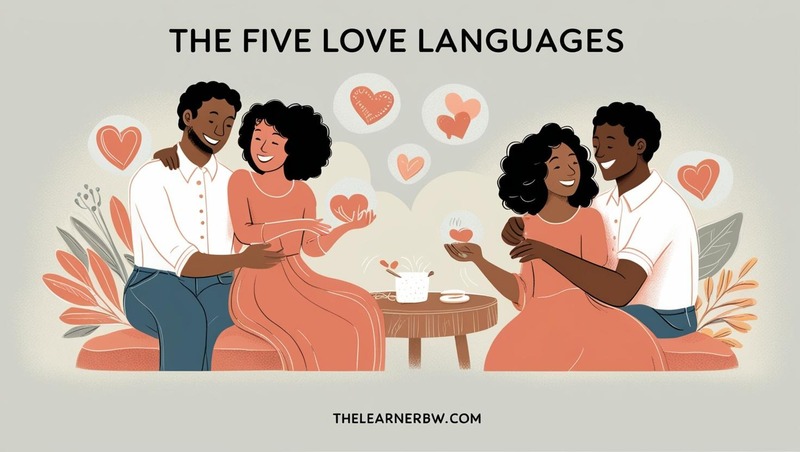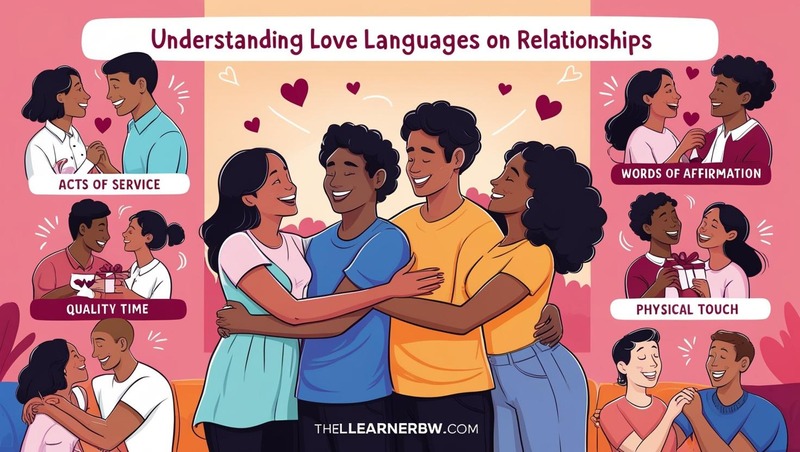Love is a complex emotion that transcends romantic gestures, deep connections, and emotional bonds. Understanding how we give and receive love can have a transformative effect on relationships. One powerful tool in understanding love dynamics is The Five Love Languages, a concept developed by Dr. Gary Chapman in his groundbreaking book, The 5 Love Languages: The Secret to Love that Lasts. These five love languages represent the different ways people express and experience love. By exploring each of them, we can gain a deeper understanding of how to strengthen relationships and improve communication with loved ones.

The Five Love Languages
1. Words of Affirmation
Words of Affirmation are all about expressing love and appreciation through spoken or written words. For individuals who speak this love language, compliments, kind words, encouragement and affirmations are essential. A simple “I love you,” or a heartfelt compliment like “You look great today,” can make them feel deeply valued. For them, words can be incredibly powerful and they thrive on verbal expressions of affection.
How It Affects Relationships
People who value words of affirmation tend to feel most loved when their partner verbally acknowledges their efforts or expresses appreciation. On the other hand, a lack of verbal affection or harsh words can be deeply hurtful to them. In a relationship, communicating regularly and lovingly can help nurture this love language and build emotional intimacy.
2. Acts of Service
For some, actions speak louder than words. Acts of Service refers to doing things for your partner to show love and appreciation. This could include everyday tasks like cooking dinner, helping with chores or running errands. These actions demonstrate care and make the recipient feel supported and valued.
How It Affects Relationships
Partners who have acts of service as their primary love language appreciate practical expressions of love. They often feel loved when their partner takes the time to ease their burdens. On the flip side, neglecting or not following through on helpful gestures can lead to feelings of being unappreciated or unloved. Acts of service show commitment and support, and it’s a great way to show love in a tangible way.
3. Receiving Gifts
Receiving Gifts is a love language centered around thoughtfulness and tangible expressions of love. It’s not about materialism, but rather the sentiment behind the gift. A meaningful gift, whether it’s something small like a handwritten note or a larger, more significant item, can be a powerful way to show affection.
How It Affects Relationships
For people who speak this love language, the gesture of giving and receiving gifts can make them feel deeply loved and appreciated. These individuals often associate the thoughtfulness behind the gift with the depth of their partner’s love. In relationships, gift-giving fosters a sense of care and attention, but it’s important that gifts are meaningful and thoughtful, rather than just material.
4. Quality Time
Quality Time is all about giving your undivided attention to your partner. This love language emphasizes spending time together, free from distractions, to nurture the relationship. Whether it’s having a conversation, watching a movie, or taking a walk, the focus is on being present and connected during those moments.
How It Affects Relationships
For individuals who prioritize quality time, shared experiences and meaningful conversations are essential. They feel most loved when their partner is fully engaged and present with them. In a relationship, it’s crucial to prioritize time together without distractions (like phones or television). It’s not just about being in the same room; it’s about fostering connection and intimacy through shared activities.
5. Physical Touch
Physical Touch involves showing love through physical expressions like holding hands, hugging, kissing or even a gentle touch on the shoulder. For some, physical contact is the most important way to feel loved and connected.
How It Affects Relationships
Those with physical touch as their primary love language crave physical closeness and affection. Simple touches can strengthen their sense of security and intimacy. In relationships, physical touch fosters emotional closeness, and its absence can create feelings of neglect or distance. A simple hug, holding hands or cuddling on the couch can significantly enhance emotional well-being and affection in a relationship.
How Understanding Love Languages Strengthens Relationships
1. Improved Communication
Understanding your partner’s primary love language helps you communicate more effectively. If you know how they prefer to receive love, you can tailor your actions to meet their needs. For instance, if your partner’s love language is words of affirmation, you’ll know that expressing your love verbally will have a greater impact than buying gifts or doing chores.
2. Conflict Resolution
Miscommunication often arises when we speak different love languages. One partner might feel neglected because they aren’t receiving love in their preferred way, while the other may not understand why their efforts aren’t appreciated. By understanding each other’s love languages, conflicts related to unmet emotional needs can be minimized. When you know what your partner needs to feel loved, you can avoid unnecessary misunderstandings and work together to meet each other’s emotional requirements.
3. Deeper Emotional Connection
When both partners understand and respect each other’s love languages, it fosters a deeper emotional connection. By meeting your partner’s emotional needs in the way that feels most natural to them, you create a stronger bond of trust and affection. This emotional closeness can lead to a more satisfying and fulfilling relationship in the long term.
4. Strengthening Your Relationship Over Time
Relationships are dynamic, and our love languages can evolve. By continuing to learn about each other’s preferences and being flexible, you can adapt and grow together. Regularly checking in with your partner and discussing how they’re feeling emotionally can ensure that both of you feel loved and valued as your relationship matures.
Love Languages and Compatibility
It’s important to note that while compatibility can be influenced by love languages, relationships thrive when both partners make an effort to understand and meet each other’s needs. Whether you share the same love language or speak different ones, the key is to be willing to learn and adapt. With effort and understanding, couples can bridge the gap between love languages and create a strong, loving foundation.
Conclusion
Exploring the love languages and how they affect relationships can provide valuable insights into how we connect with others. By understanding the five love languages—words of affirmation, acts of service, receiving gifts, quality time and physical touch—you can improve communication, resolve conflicts and strengthen your emotional bond with your partner. It’s about expressing love in the way that resonates most deeply with the other person, allowing for a deeper and more fulfilling connection. Whether you’re in a romantic relationship, friendships, or family dynamics, embracing love languages can lead to stronger, healthier and more harmonious relationships.



